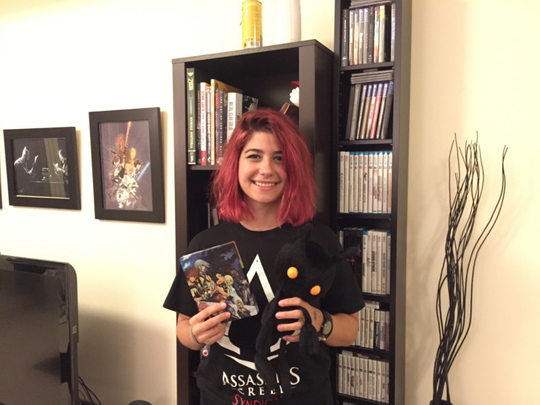
Sharjah
Despite women constituting over half the world’s gamers, as stated in a report by UK-based newspaper The Guardian, they are vilified, harassed and degraded constantly. Video games often lack a female lead. If there are women in the games at all, they fall into the usual stereotype: the prize, the damsel-in-distress or the provocateur.
Lynn Jisr, who graduated from the American University of Beirut with a degree in graphic design, was fortunately spared most of this. It was only when she got older and began to read more widely that she realised what a battlefield the gaming world can be.
She has been an editor at a leading games and entertainment media company in Dubai for over a year. Though not the first, she is currently the only woman to work there.
During our interview, her fading pink hair was pulled back in a ponytail, revealing the various piercings on each pointed ear. If you know your games, upon spotting her you’d probably notice that she bears a strong resemblance to Kairi, one of the main characters in the Kingdom Hearts series. This is not unintentional. She looks both feminine and tomboyish, both fierce and small. It’s hard to imagine someone her size working in a giant industry that is often so cruel to people like her - women.
Jisr writes game reviews and opinion pieces, films livestreams, and hosts a show on the company’s YouTube channel.
“It kind of just happened,” she said self-consciously, laughing at the way it worked out.
She had been working as a freelance copy-writer when her husband Tarek, who works in the gaming industry, met someone from the company. He told Tarek that they needed a female editor, and he mentioned Jisr. An audition later, they sat her down and asked what it would take for her to stay.
“Nothing! It’s every gamer’s dream to work in the gaming industry,” she said.
Her eyes were wide, her expression incredulous, like it was the most obvious thing in the world that she would take the job the minute it was offered.
It probably is obvious. Jisr has been gaming since she was six, or seven, or eight; she can’t quite remember. She was never interested in the same things that her peers were, growing up, so she was dismissed as the “weird child”. As a result, Jisr ended up spending time with her brother and his friends - all of them gamers.
So began her lifelong love affair with video games. The Kingdom Hearts games mean the most. They brought her and her best friend closer together, their relationship correlating with the one between Kairi and Sora. As Kairi evolved, so did Jisr, and to this day the resemblance remains. The first time she went to get her hair cut short, it was Kairi’s picture she took to give the hair-dresser, a fact she recounted with her face hidden in her hands.
But those haven’t been the only impact of games in her life. They also lead to two whole shelves of games in her living room and a ton of figurines lovingly arranged both in her home and on her desk at work. But most importantly, games taught her how to be a good person. She learned from the heroes, and even the villains. Despite the exaggerated storylines, their virtues have been something to aspire to.
That doesn’t mean, however, that she never gets mean comments. She was quick to explain that pure close-mindedness was the problem. Either way, it isn’t something she abides by. Jisr chooses to focus on the positives, because that’s what she feels will help her cultivate a regional gaming culture that is more accepting and more willing to take girls seriously. She invests her energy wisely, grateful for the comments filled with helpful advice on how to jump higher or reload faster, the support of her family and her husband, even on off days, and the camaraderie with her colleagues.
Talking about the apparent lack of female gamers in the Middle East, Jisr observed that it isn’t that they don’t exist, but rather that they don’t have as much of an online presence. Of course, she doesn’t blame them. Jisr has seen how whenever a girl does join in the conversation, the usual response is to ask for her number rather than what games she likes to play. Gaming in the region is still so new, Jisr added, so it would take time for it to spread and the community to grow.
Jisr also agreed that it can be intimidating, for that and a host of other obvious reasons. Her advice? A frustrated call to arms. She didn’t mean to dismiss female gamers’ concerns. She conceded to how difficult it is and how scary it is.
“Do it anyway,” she urged.
For some, Jisr may be just another person trying to join the ‘boys’ club’. But Jisr is really more like the bridge between the gaming world in the Middle East and the women who so rarely see themselves represented. It’s hard to think of a better metaphor; “Jisr” means “bridge” in Arabic.
— The writer is a media student at the American University of Sharjah.








